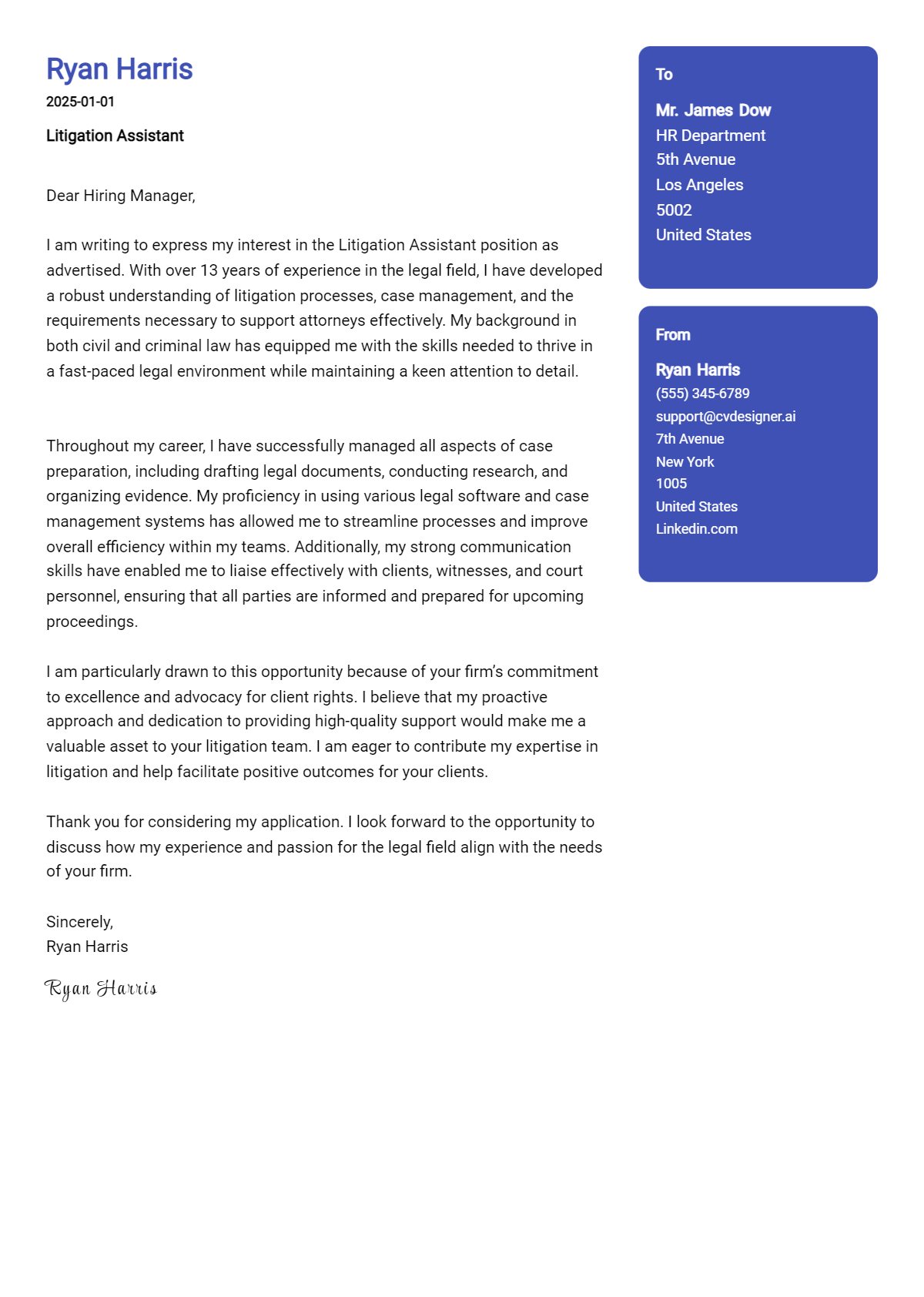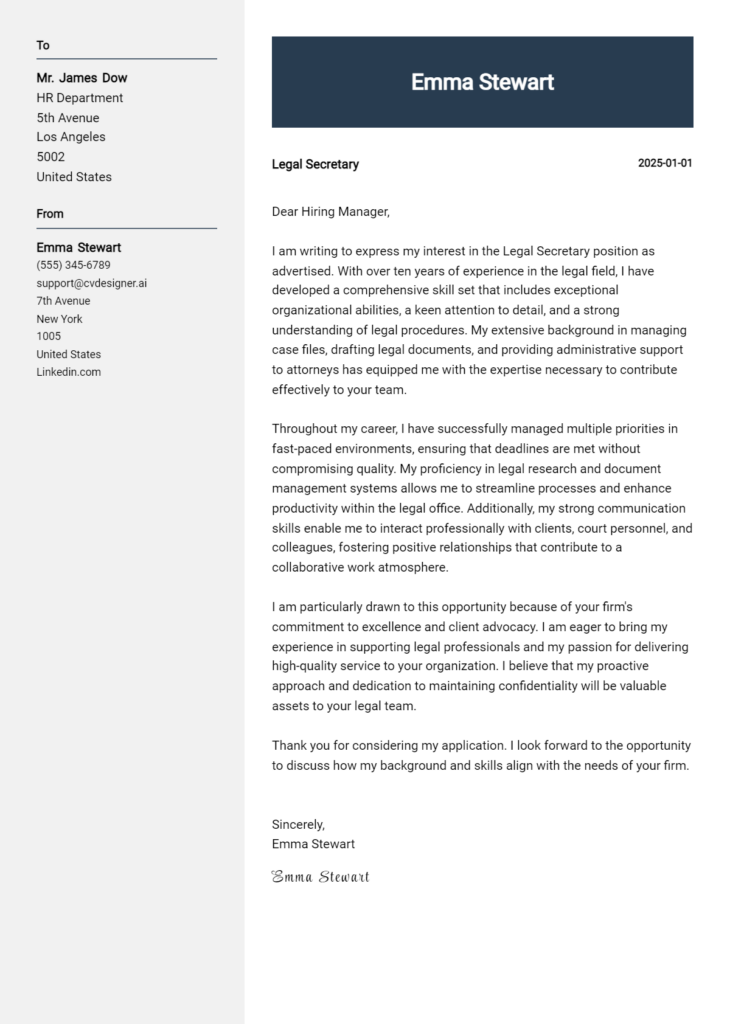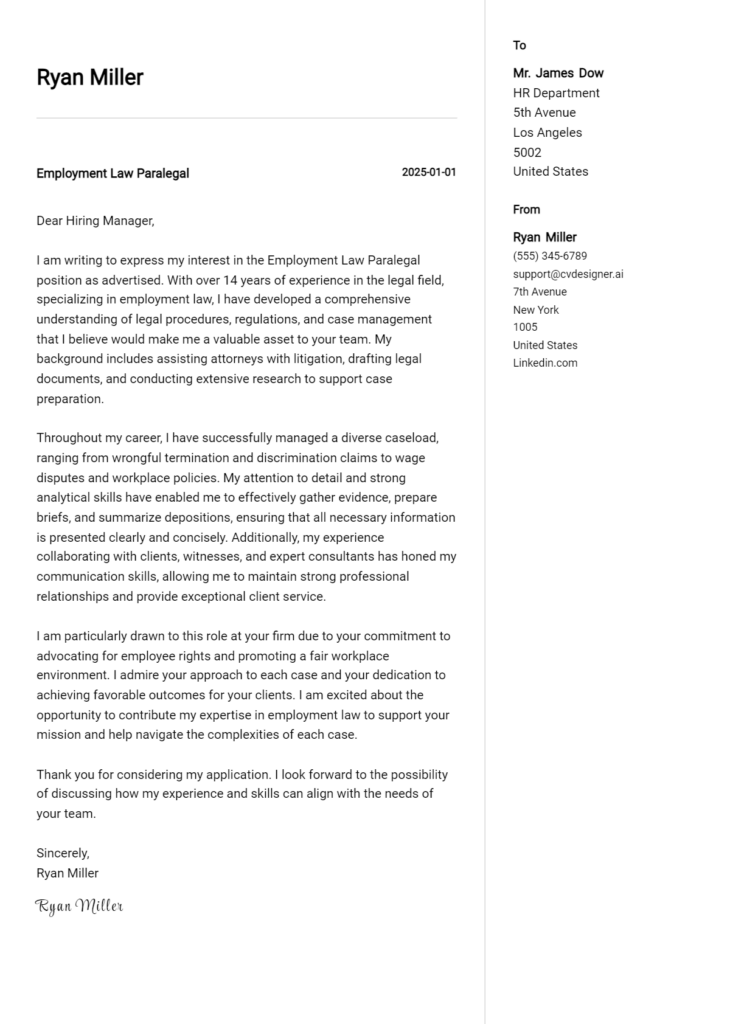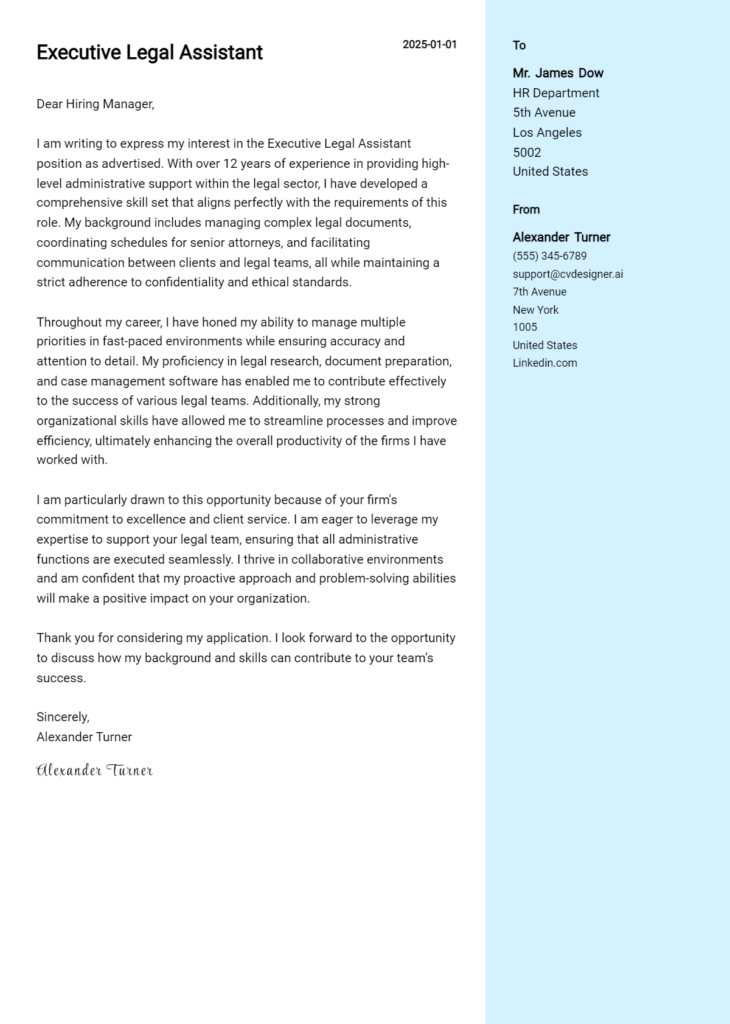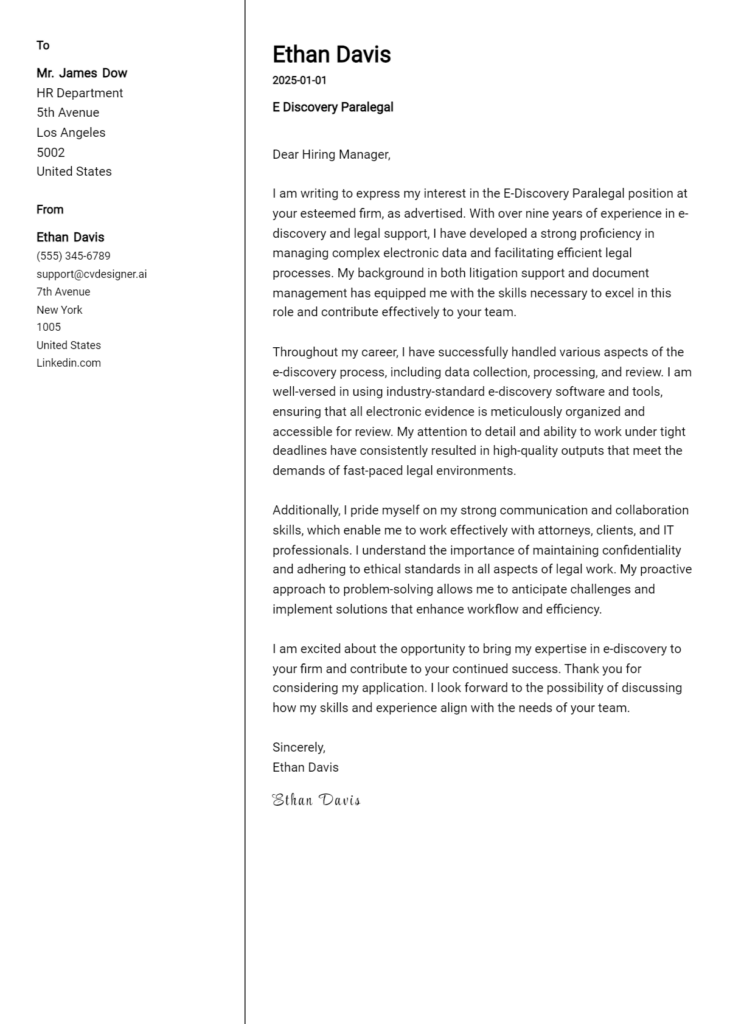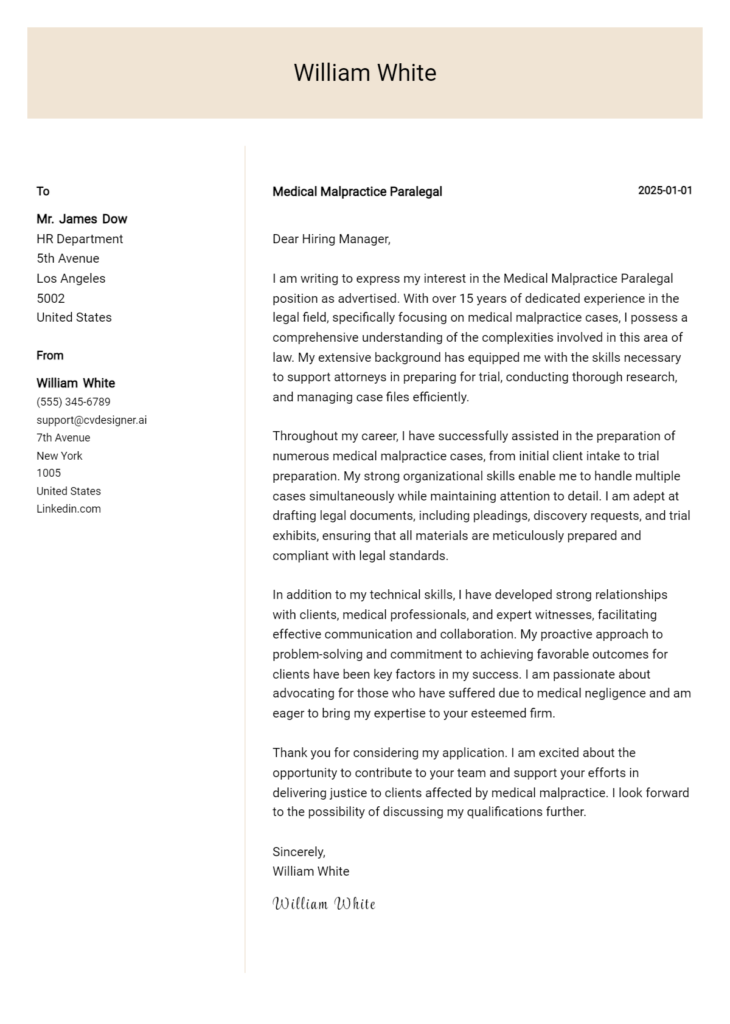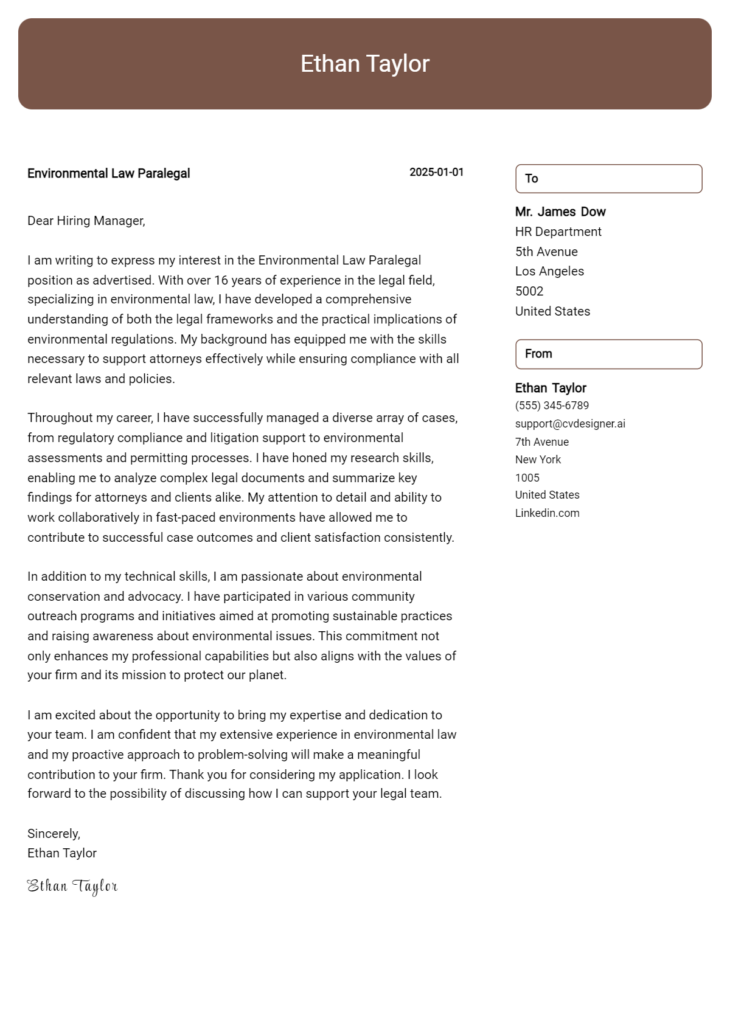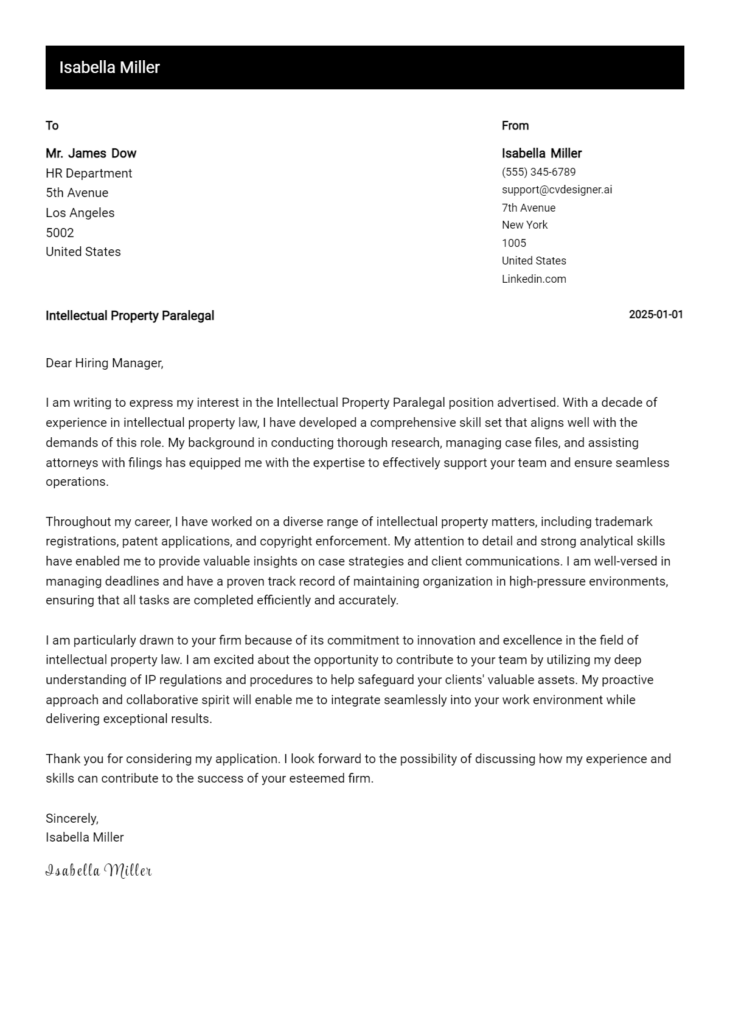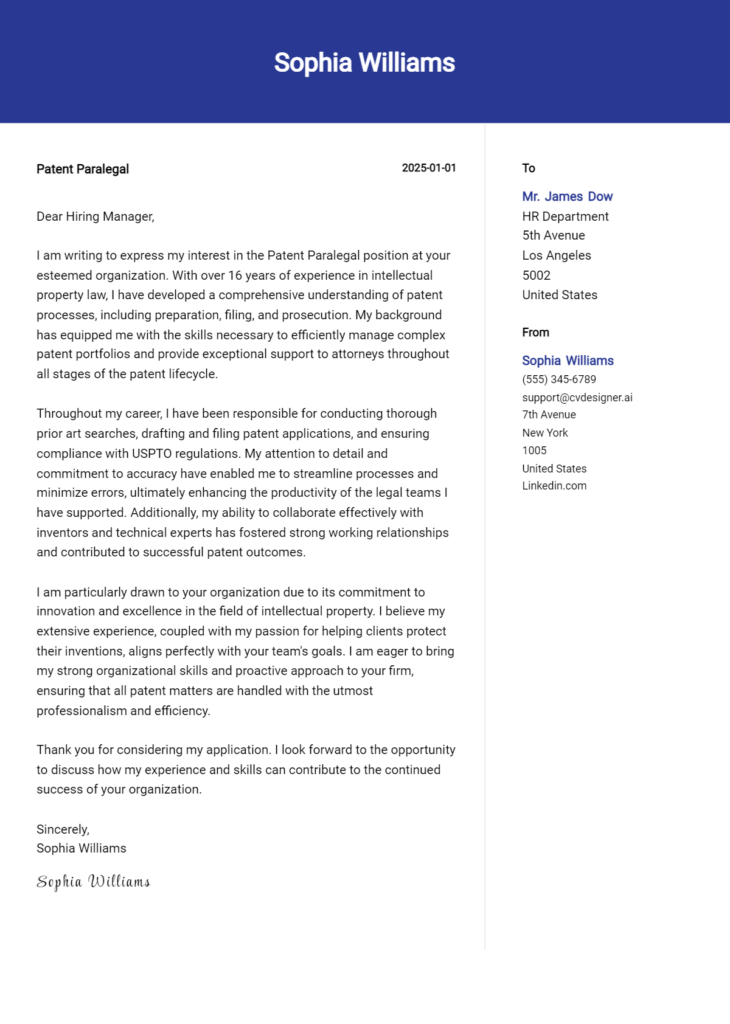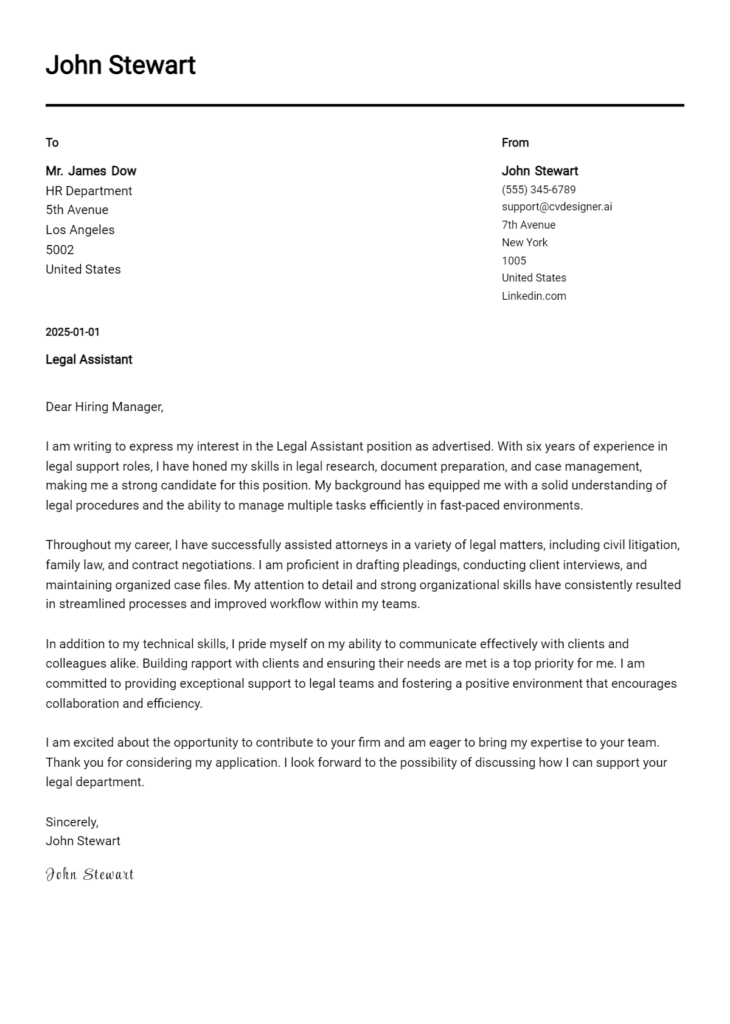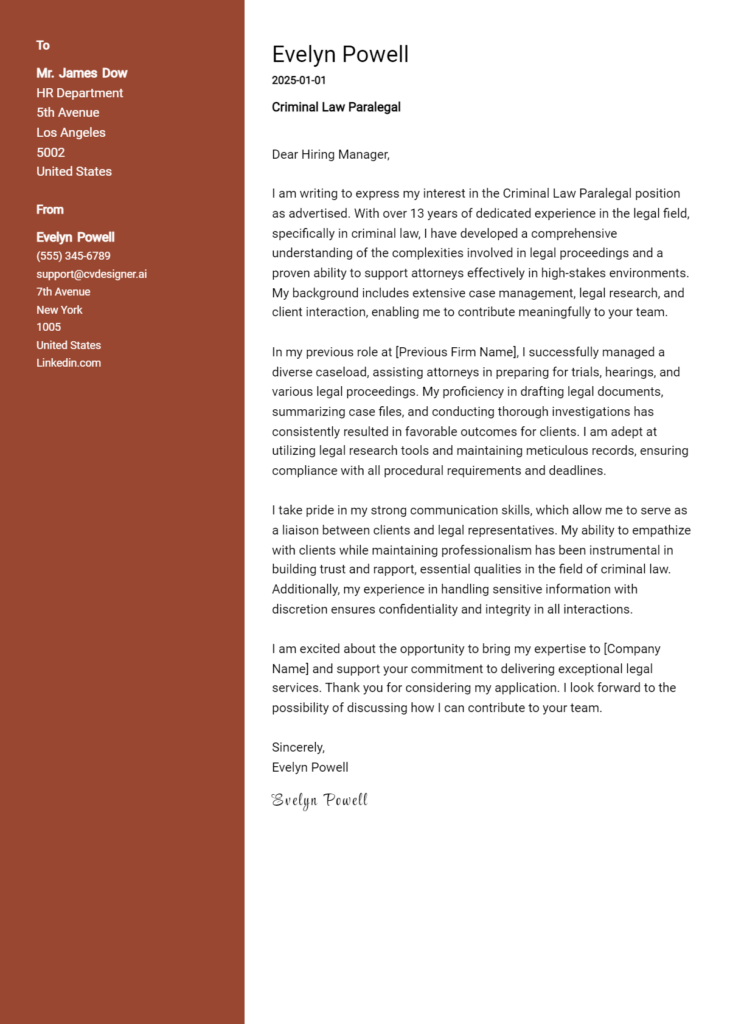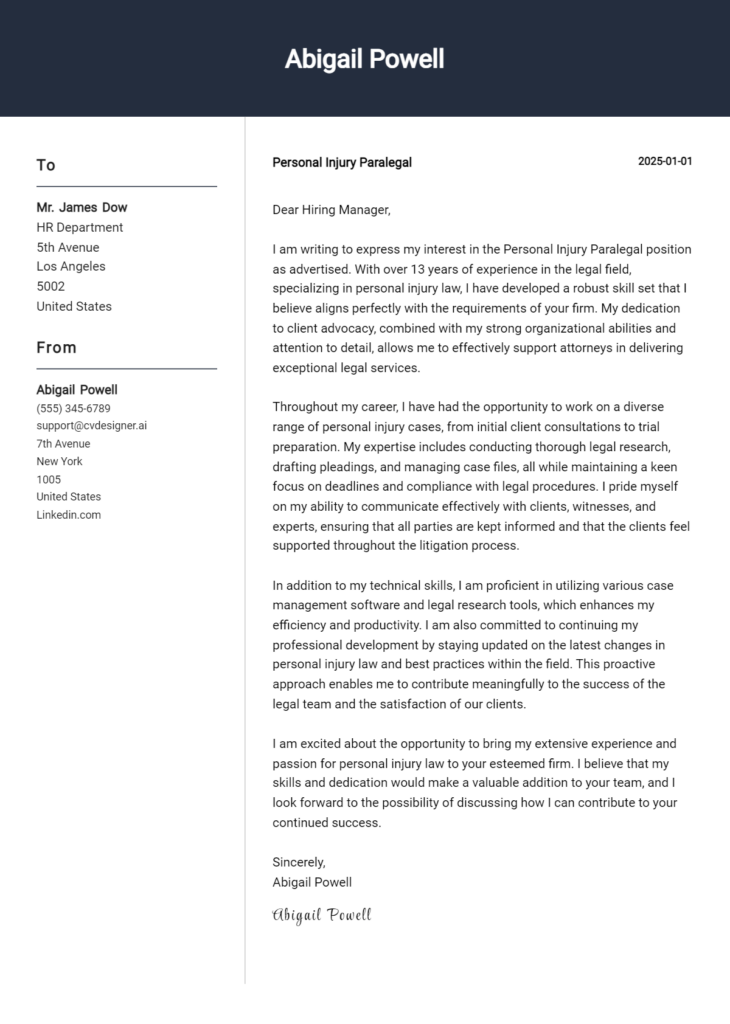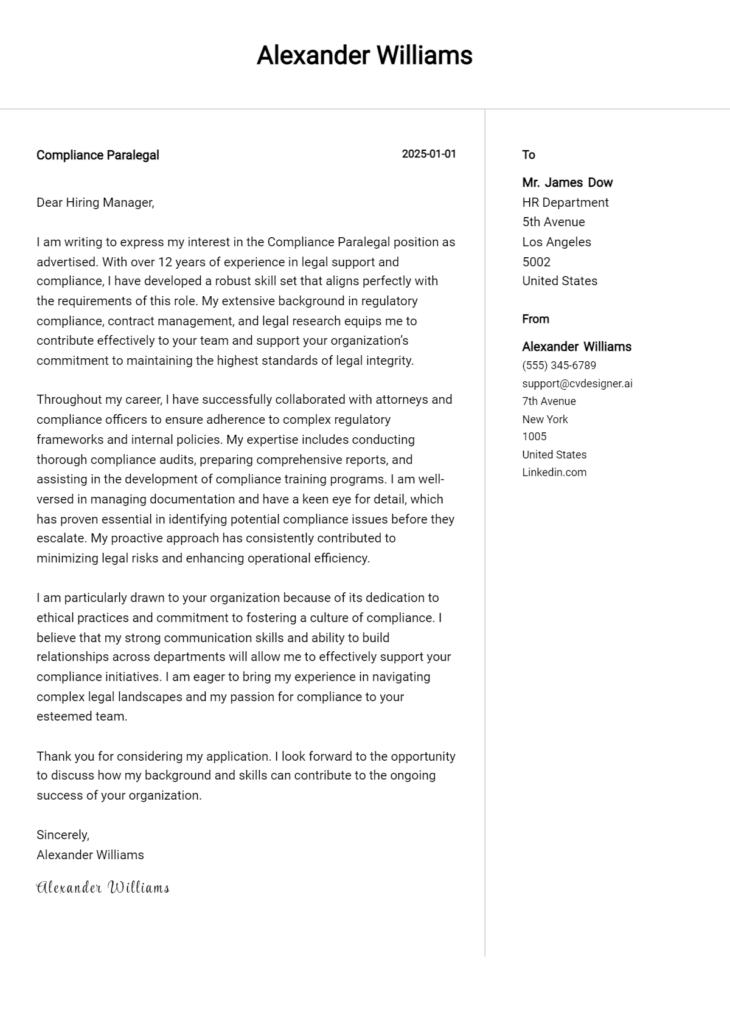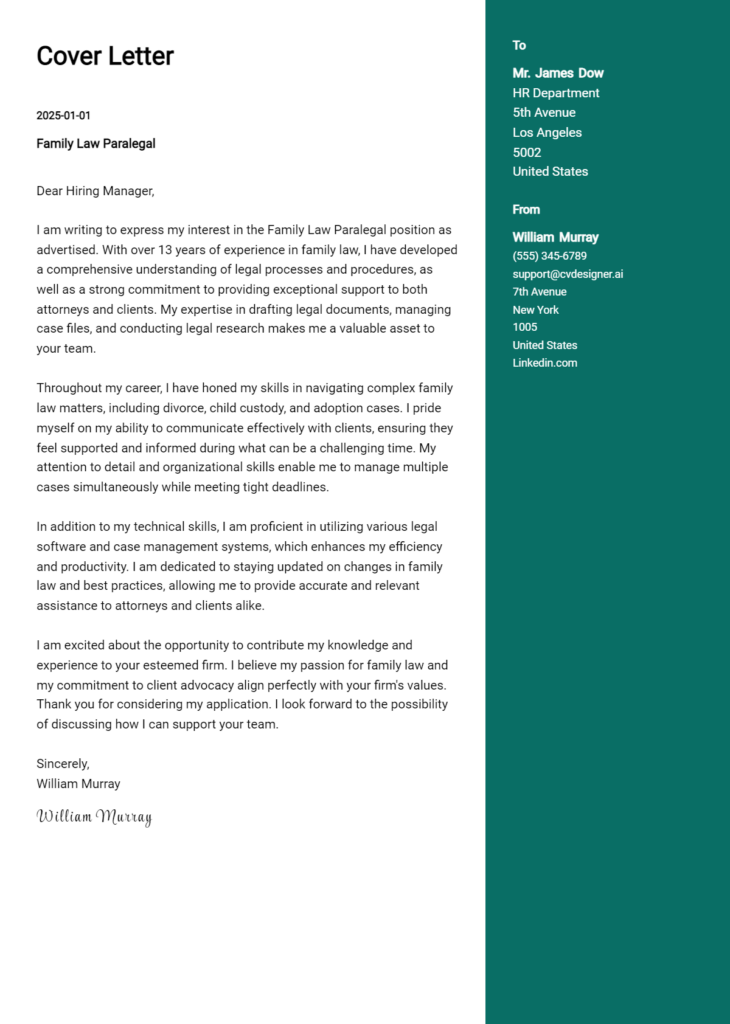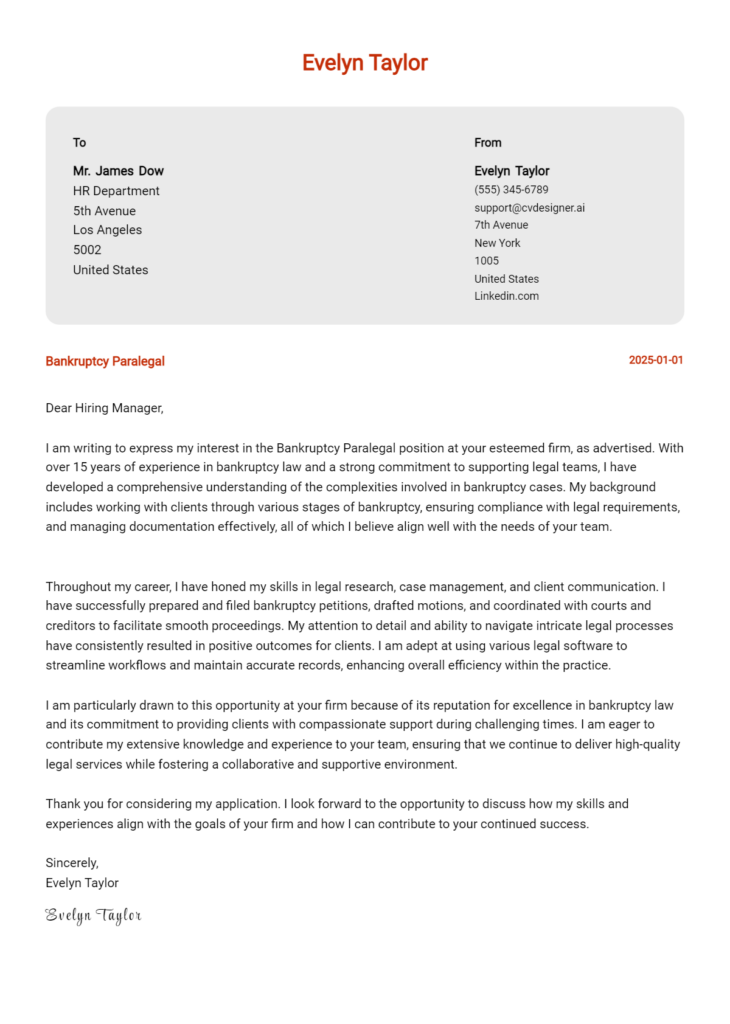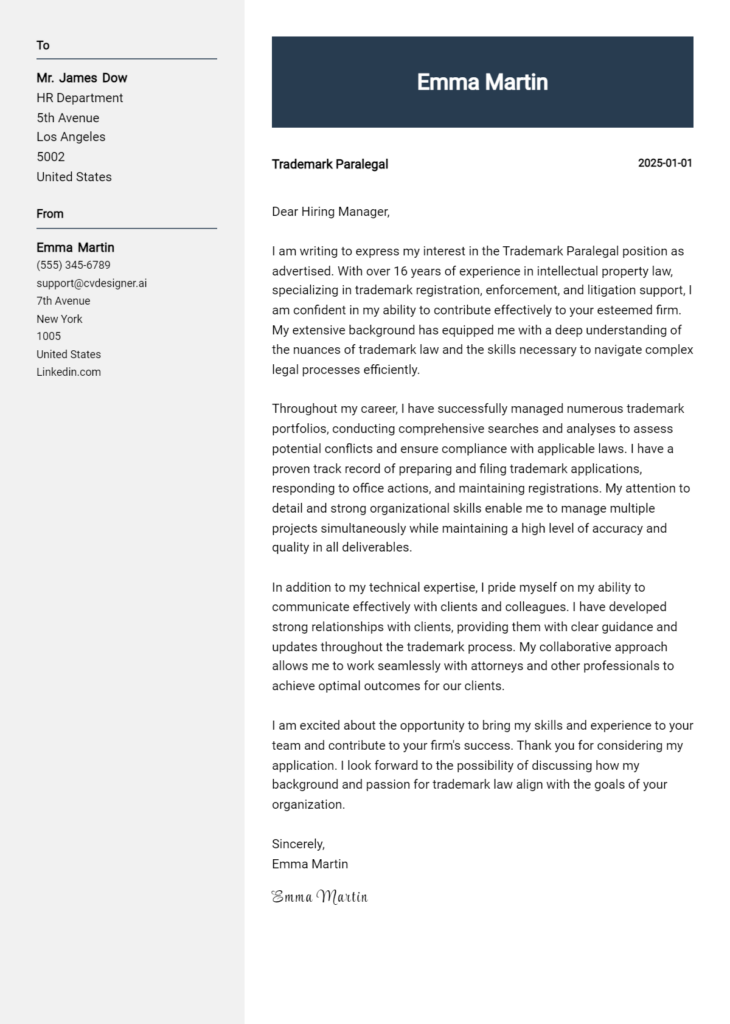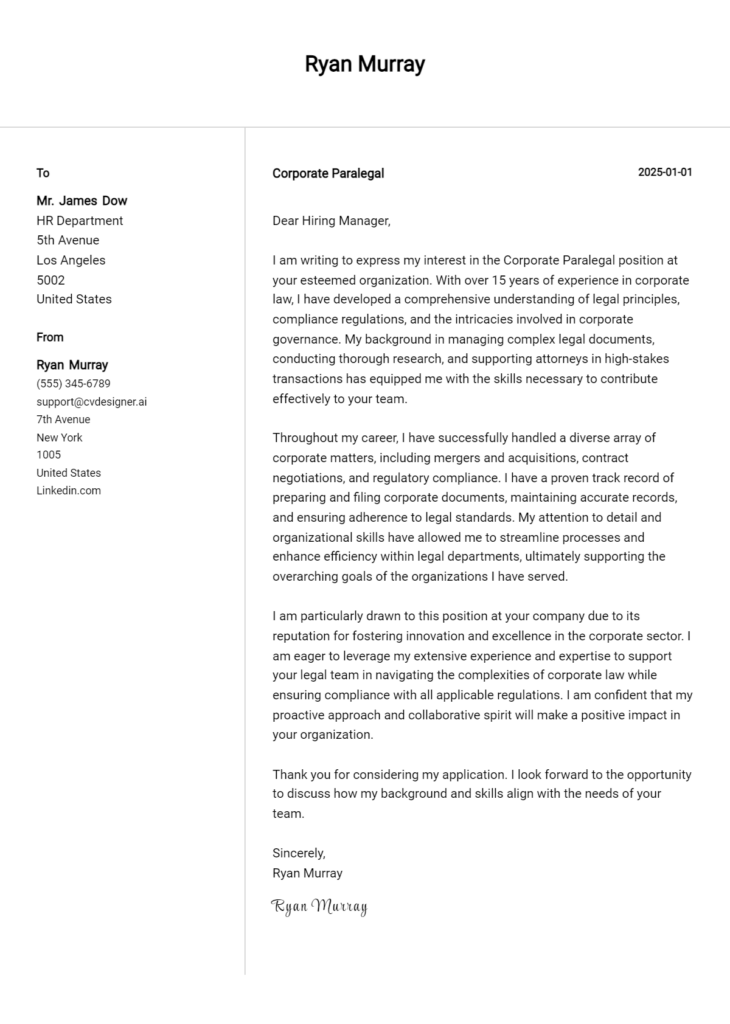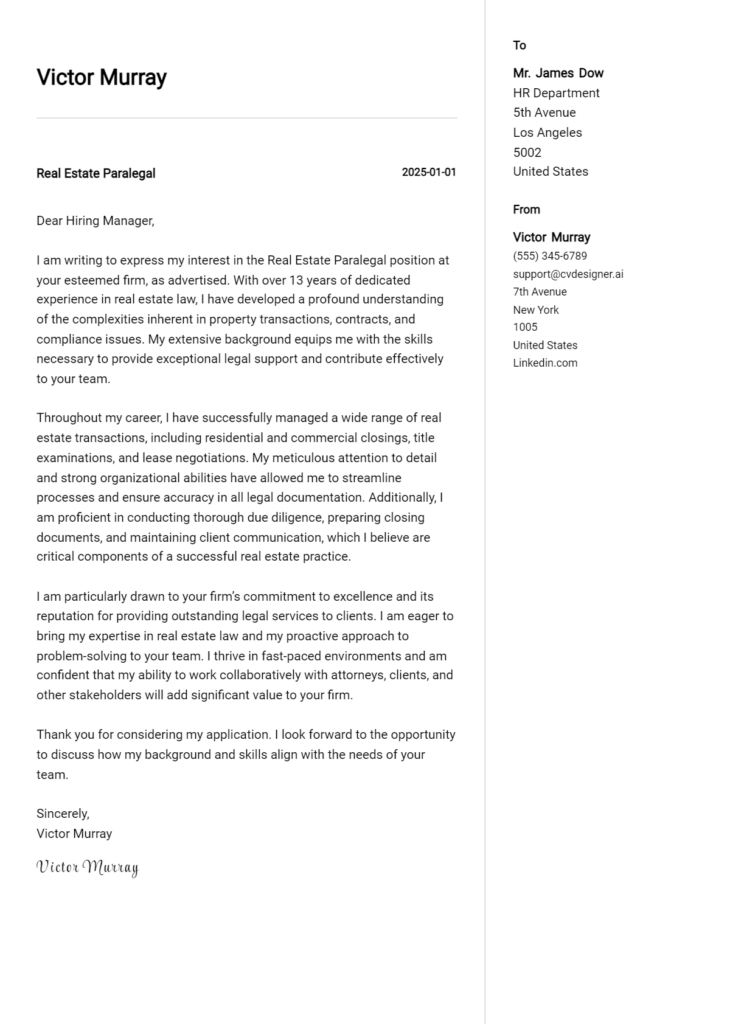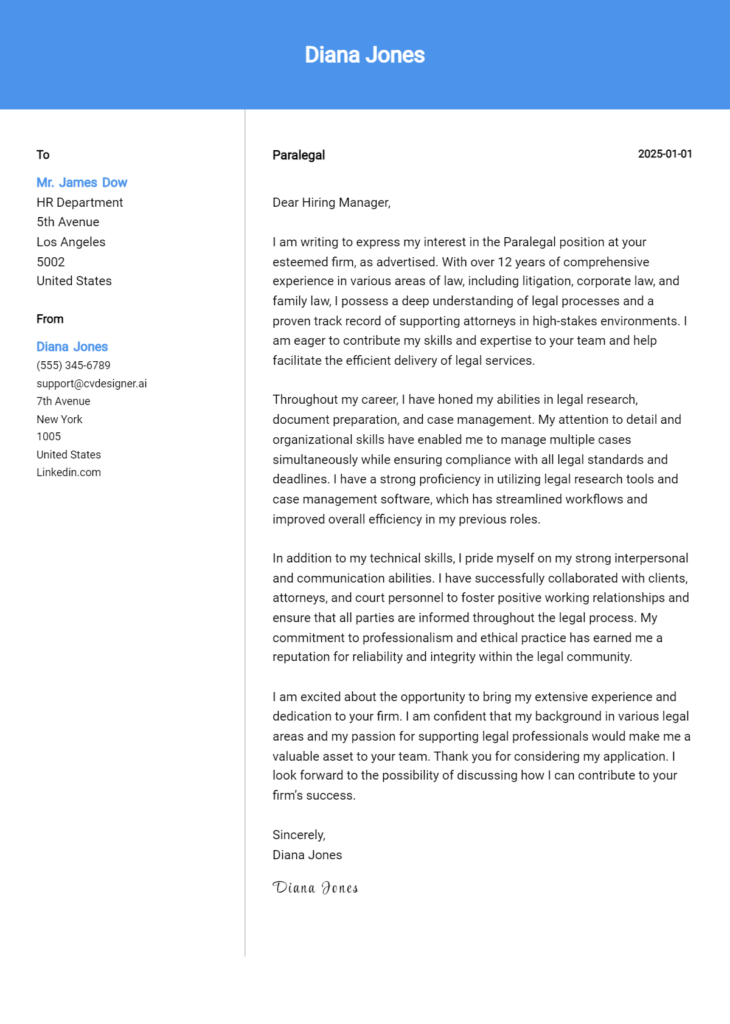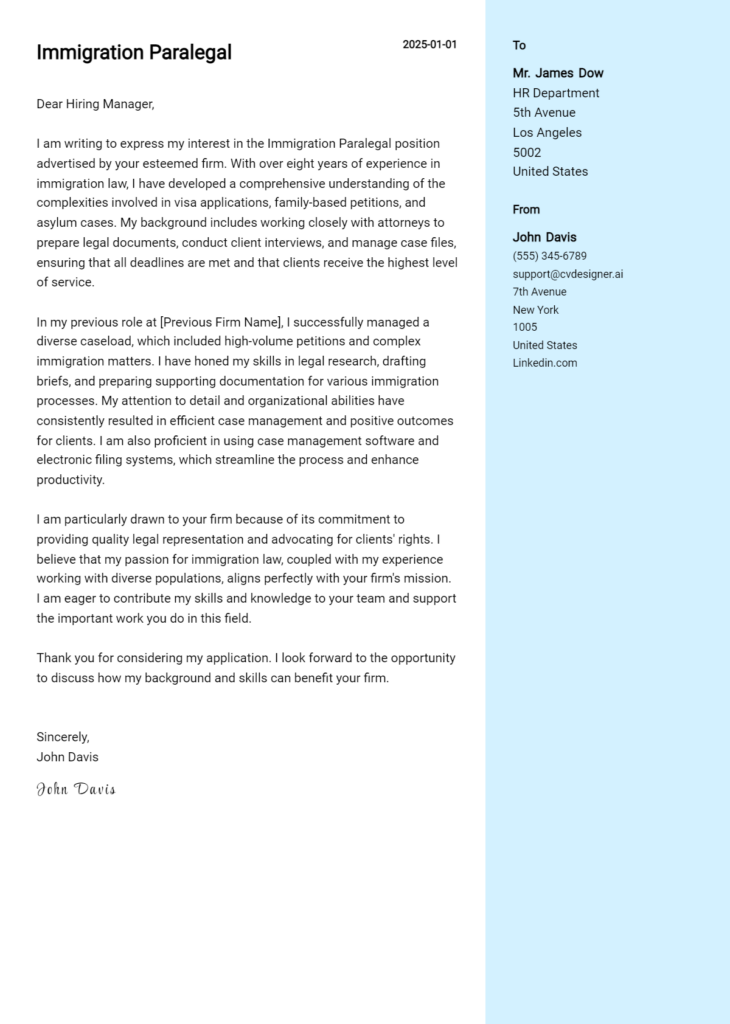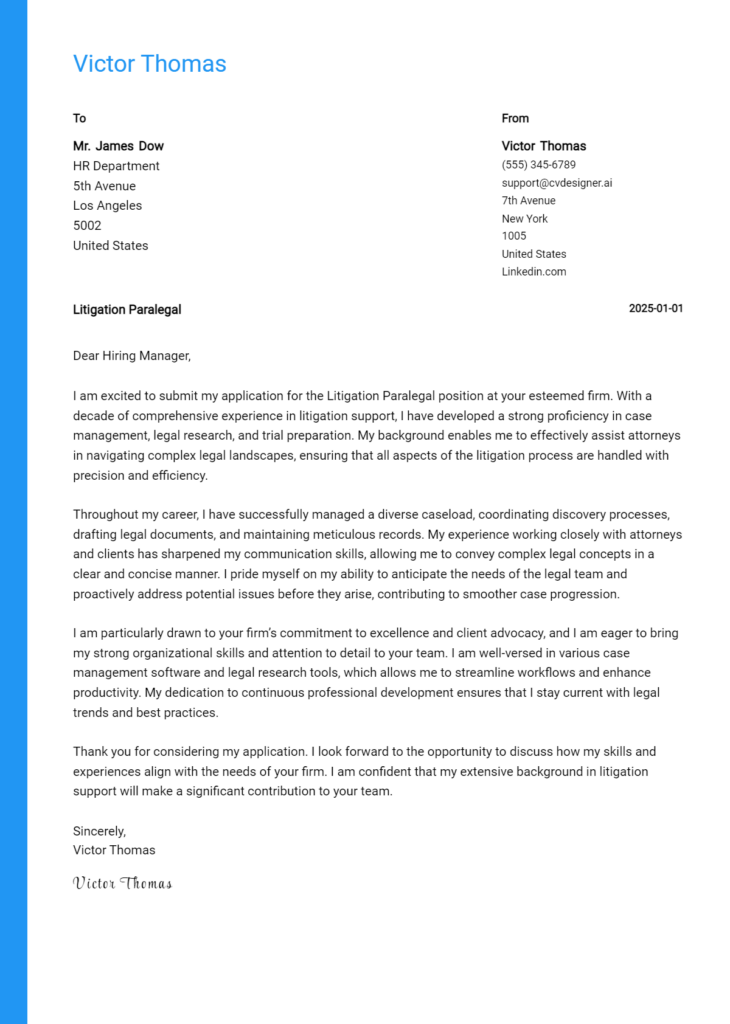Litigation Assistant Cover Letter Examples
Explore additional Litigation Assistant cover letter samples and guides and see what works for your level of experience or role.
How to Format a Litigation Assistant Cover Letter?
Crafting a persuasive cover letter is essential for a Litigation Assistant, as it serves as a first impression to potential employers. The way you format your cover letter can significantly influence how your application is received, showcasing your organizational skills and attention to detail—qualities that are paramount in the legal field. A well-structured cover letter not only highlights your relevant experience but also demonstrates your ability to communicate effectively and professionally.
In this guide, we'll delve into the essential components of a Litigation Assistant cover letter, offering insights and specific examples to enhance your application.
We'll focus on the key sections of a professional cover letter, including:
- Cover Letter Header
- Cover Letter Greeting
- Cover Letter Introduction
- Cover Letter Body
- Cover Letter Closing
Each element is crucial in underlining your qualifications and professionalism. Let’s break down each part to help you create a standout Litigation Assistant cover letter.
Importance of the Cover Letter Header for a Litigation Assistant
The cover letter header is a critical component that sets the tone for your application as a Litigation Assistant. It provides essential information that helps the employer quickly identify who you are and how to contact you. A well-organized header should include your contact information, the date, and the recipient's details, all presented clearly and professionally. This clarity not only reflects your attention to detail but also enhances your credibility as a candidate in the legal field, where precision and professionalism are paramount.
A strong header conveys a sense of professionalism and readiness, while a weak header can create confusion and detract from your overall presentation. Below are examples illustrating the difference between a strong and a weak cover letter header for a Litigation Assistant.
Strong Example
Jane Doe 123 Legal Lane Cityville, ST 12345 (123) 456-7890 jane.doe@email.com October 10, 2023 Mr. John Smith Hiring Manager Law Firm XYZ 456 Justice Ave Cityville, ST 12345
Weak Example
jane doe october 10, 2023 law firm 123
The Importance of the Cover Letter Greeting
The greeting of a cover letter is crucial as it sets the tone for the entire document. A well-crafted greeting not only demonstrates professionalism but also personalizes the communication by directly addressing the hiring manager. This approach can create a connection with the reader from the very beginning. Avoiding generic greetings—such as "To Whom It May Concern"—is essential, as they may suggest a lack of effort or attention to detail. Researching the recipient's name, if necessary, can help you craft a more engaging and tailored greeting.
Strong Greeting Example
Dear Ms. Johnson,
Weak Greeting Example
To Whom It May Concern,
Importance of a Well-Crafted Cover Letter Introduction for a Litigation Assistant
A well-crafted cover letter introduction is crucial for a Litigation Assistant position, as it serves as the first impression for potential employers. This initial paragraph needs to capture the hiring manager's attention, clearly express the candidate’s enthusiasm for the role, and succinctly highlight key skills or achievements relevant to the legal field. A strong introduction can set the tone for the rest of the letter, demonstrating the candidate's professionalism and passion, while a weak introduction may fail to engage and could lead to the application being overlooked. Below are examples of both strong and weak cover letter introductions for a Litigation Assistant role.
Strong Example
Dear [Hiring Manager's Name], I am excited to apply for the Litigation Assistant position at [Company Name], as advertised on [Job Board/Company Website]. With over three years of experience supporting litigation teams in fast-paced environments, I have developed a keen aptitude for legal research, document preparation, and case management. My proven ability to effectively communicate with clients and maintain meticulous attention to detail has consistently contributed to successful case outcomes. I am eager to bring my skills and dedication to your esteemed firm, known for its commitment to excellence in legal representation.
Weak Example
To Whom It May Concern, I am writing to apply for the Litigation Assistant job that I found online. I have some experience in the legal field, and I think I might be a good fit. I can do paperwork and type pretty fast, which might help the team. I hope you will consider my application.
Purpose of the Cover Letter Body for a Litigation Assistant
The cover letter body for a Litigation Assistant serves as a critical component where the candidate can effectively communicate their relevant skills, experiences, and the value they would bring to the firm. It is an opportunity to highlight specific projects or accomplishments that demonstrate their ability to support attorneys in managing cases, conducting legal research, organizing documents, and ensuring compliance with legal procedures. A compelling cover letter body not only showcases the candidate’s qualifications but also reflects their understanding of the litigation process and their commitment to contributing positively to the legal team.
Strong Example
Dear Hiring Manager, I am excited to apply for the Litigation Assistant position at [Company Name]. In my previous role at [Previous Firm Name], I successfully managed a high-profile case involving complex commercial litigation, where I coordinated the discovery process and streamlined document management, reducing retrieval time by 30%. My meticulous attention to detail and strong organizational skills allowed me to assist in preparing trial materials that significantly contributed to a favorable outcome for our client. Additionally, I have experience in conducting thorough legal research, where I uncovered pivotal case law that strengthened our arguments in court. I am eager to bring my expertise in litigation support to [Company Name] and contribute to your team's success. Sincerely, [Your Name]
Weak Example
Dear Hiring Manager, I want to apply for the Litigation Assistant job. I have some experience in legal stuff, and I think I can do the job. In my last job, I helped with paperwork and sometimes did research. I believe I can learn quickly and help your team. I look forward to hearing back from you. Best, [Your Name]
Importance of the Cover Letter Closing for a Litigation Assistant
The closing paragraph of a cover letter for a Litigation Assistant is crucial as it provides a final opportunity to summarize qualifications, express enthusiasm for the position, and encourage the hiring manager to take the next steps, such as reviewing the resume or scheduling an interview. A strong closing not only reinforces the applicant's suitability for the role but also leaves a positive impression that can influence the hiring decision.
Strong Example
Thank you for considering my application for the Litigation Assistant position at [Company Name]. With my extensive experience in legal research, case management, and strong organizational skills, I am excited about the opportunity to contribute to your team. I am eager to bring my passion for litigation support to [Company Name] and help facilitate successful outcomes for your clients. I look forward to the possibility of discussing my application further and am available at your convenience for an interview. Please find my resume attached for your review.
Weak Example
I hope you like my application. I think I could do the job. If you want to talk, you can call me or something. I attached my resume. Thanks.
When applying for the role of a Litigation Assistant, crafting a compelling cover letter is crucial to making a strong first impression. This document not only highlights your qualifications but also showcases your technical skills, problem-solving abilities, familiarity with the Software Development Life Cycle (SDLC), teamwork, and a genuine passion for continuous learning. By effectively communicating these attributes, you can position yourself as a standout candidate. Here are five detailed tips to help you write an effective cover letter for this role.
Tips for Writing an Effective Cover Letter for Litigation Assistant
Highlight Technical Skills: Your cover letter should emphasize your technical skills relevant to litigation support, such as proficiency in legal research databases, case management software, and document management systems. Be specific about the tools and technologies you are familiar with, as this demonstrates your preparedness for the role.
Showcase Problem-Solving Abilities: Litigation often involves complex issues that require innovative solutions. Use your cover letter to provide examples of how you've successfully navigated challenges in previous roles. Whether it's resolving a scheduling conflict or managing a last-minute document request, illustrating your problem-solving capabilities will make you more appealing to potential employers.
Demonstrate SDLC Knowledge: Understanding the Software Development Life Cycle can be a significant asset, especially if your firm utilizes technology to manage cases. Mention any experience you have with SDLC processes, including requirements gathering, testing, and implementation of legal tech tools. This can set you apart from candidates who lack this knowledge.
Emphasize Teamwork: Litigation is often a collaborative effort, and your ability to work well within a team is essential. Share specific instances where you've successfully collaborated with attorneys, paralegals, or other team members to achieve a common goal. Highlighting your interpersonal skills can help demonstrate your fit within the firm's culture.
Express a Passion for Continuous Learning: The legal field is constantly evolving, and a willingness to learn can be a valuable trait. Discuss any recent training, certifications, or professional development activities you've undertaken. This not only shows your commitment to personal growth but also indicates that you are proactive in keeping your skills up to date.
For additional guidance, consider utilizing cover letter templates or a cover letter builder to streamline your writing process and create a polished final product.
Common Mistakes to Avoid in a Litigation Assistant Cover Letter
Crafting a compelling cover letter is essential for standing out in the competitive field of litigation assistance. Avoiding common mistakes can significantly enhance your chances of securing an interview. Here are some frequent missteps to watch out for:
Generic Greetings: Addressing your letter "To Whom It May Concern" can come off as impersonal. Instead, try to find the hiring manager's name for a more personalized touch.
Lack of Specificity: Failing to tailor your cover letter to the specific job and firm can make your application feel generic. Research the firm and mention relevant skills or experiences that align with their needs.
Too Much Jargon: While legal terminology is important, using overly complex language can alienate the reader. Strive for clarity and conciseness in your communication.
Neglecting Formatting: A cluttered or unprofessional layout can detract from your message. Ensure you adhere to a clean cover letter format that enhances readability.
Repetition of the Resume: Your cover letter should complement your resume, not reiterate it. Use this opportunity to highlight unique experiences or insights that demonstrate your suitability for the role.
Ignoring Proofreading: Spelling and grammar mistakes can undermine your professionalism. Always proofread your letter or have someone else review it before submission.
Omitting a Strong Closing: Failing to include a call to action or a strong closing statement can leave a lackluster impression. Conclude with enthusiasm about the opportunity and a request for an interview.
By steering clear of these pitfalls, you can create a strong cover letter that effectively showcases your qualifications as a Litigation Assistant. For inspiration, check out cover letter examples to help guide your writing process.
Cover Letter FAQs for Litigation Assistant
What should I include in my cover letter for a Litigation Assistant position?
In your cover letter for a Litigation Assistant position, begin with a compelling introduction that states the job you're applying for and how you found it. Highlight your relevant experience, such as familiarity with case management, legal research, and document preparation. Discuss any specific skills that align with the job description, like proficiency in legal software or strong organizational abilities. It's also crucial to mention your understanding of litigation processes and the ability to support attorneys effectively. Conclude by expressing your enthusiasm for the role and your desire to contribute to the firm's success.
How can I tailor my cover letter for a specific law firm?
To tailor your cover letter for a specific law firm, start by researching the firm’s practice areas, culture, and recent cases or accomplishments. Mention any of these in your letter to demonstrate your genuine interest in the firm. Use the firm’s language and values as a guide to craft your narrative, ensuring it aligns with their mission. Additionally, refer to any connections you might have, such as mutual contacts or experiences. Personalizing your cover letter shows that you’ve invested time in understanding the firm and its needs, making you a more appealing candidate.
How long should my cover letter be?
Your cover letter should typically be one page long, consisting of three to four paragraphs. Aim for a concise yet comprehensive presentation of your qualifications. Keep each paragraph focused; the introduction should hook the reader, the body should delve into your relevant skills and experiences, and the conclusion should clearly express your enthusiasm and desire for an interview. Avoid excessive detail or lengthy explanations; instead, aim for clarity and impact. A well-structured, succinct cover letter will convey professionalism and respect for the hiring manager’s time.
Should I address my cover letter to a specific person?
Yes, addressing your cover letter to a specific person is highly recommended. If the job posting includes a contact name, use it to personalize your letter. If no name is provided, do some research to find the hiring manager or the head of the department. Using a specific name creates a connection and shows initiative, making your application stand out. If you can't find a name, addressing it "Hiring Manager" is acceptable, but be sure to avoid generic salutations like "To Whom It May Concern." Tailoring your salutation enhances professionalism and engagement.
Build your Cover Letter in minutes
Use an AI-powered cover letter builder and have your letter done in 5 minutes. Just select your template and our software will guide you through the process.

